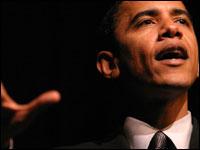Transcript
BROOKE GLADSTONE:
Even if we've redeemed ourselves in the eyes of the world, it also seems we've given the world a massive headache. Steven Kull is the director of Worldpublicopinion.org, an international project that studies worldwide opinions of, among other things, the United States.
He says the election of Barack Obama presents the world with two conflicting images of the United States that it must reconcile, and that, says Kull, has caused a colossal case of global cognitive dissonance.
STEVEN KULL:
It’s when you get two items of information that don't really fit together, and it creates tension. In many cases, people pull away from it and try to avoid it but when they do pay attention to it, it kind of shakes up their assumptions.
And there is an emotional aspect to it, too. If people are feeling angry at America and they've settled on an image of the U.S. as being a particular way and then they get information that is contrary to that, it’s emotionally disorienting, as well as cognitively disorienting.
BROOKE GLADSTONE:
You had a clear example of that in Malaysia not long ago.
STEVEN KULL:
Yes. I was at a conference on U.S.-Islamic world relations, and people were saying, I just really can't grasp this. One man put his hand to his head, as if his head was hurting, saying, “The idea that America could elect a black man, it’s just – I just can't grasp it.”
BROOKE GLADSTONE:
If we were to just be blunt about it, they see America as - what, an intolerant bully?
STEVEN KULL:
I think the core perception is that the U.S. is essentially in a coercive relationship with the world. And there are a lot of polling data that point to this perception, particularly in the Muslim world.
And Obama’s posture is not one of coerciveness. He tends not to present a narrative of America in conflict, leading to American victory. People notice that. It doesn't resolve all the issues, but it makes them think, hmm, maybe this is going to be different.
BROOKE GLADSTONE:
Now, in some parts of the world people have told you that they don't believe Obama will actually get to govern because “they” won't let him. Who’s “they?”
STEVEN KULL:
Well, I can't say that we found these in polls, but I have done focus groups and talked to people in a variety of circumstances, and there is a tendency to see the U.S. as, in a sense, controlled or governed by a somewhat secret cabal of corporate and government leaders that are kind of behind the scenes. And Obama is seen as not really of them, so they're sort of mystified - how did Obama get elected?
Well, they think maybe he’s just being put up there as a kind of nice face for the rest of the world but he can't really change policies. So that’s one way that people resolve the cognitive dissonance, by saying that it’s, in a sense, fake, that there are hidden forces behind it, and “they,” the hidden forces, won't really allow Obama to govern in the way that he says he wants to.
BROOKE GLADSTONE:
Do you know if there’s a kind of cognitive dissonance for Americans, when it comes to Obama?
STEVEN KULL:
Well, I think to some extent Americans are surprised that they have elected an African-American. Now, this is something that’s been studied at some length and for some decades now. If you ask an American, would you let your children, say, play with someone from another race, and then ask, do you think your neighbors would, people tend to say, well, I am less racist than others.
And there are a lot of reasons to suggest that their estimations of themselves are actually correct, but they underestimate others. So Americans are having a little bit of dissonance, I think, between themselves and what they assume about other Americans.
BROOKE GLADSTONE:
Thank you very much.
STEVEN KULL:
You’re welcome.

